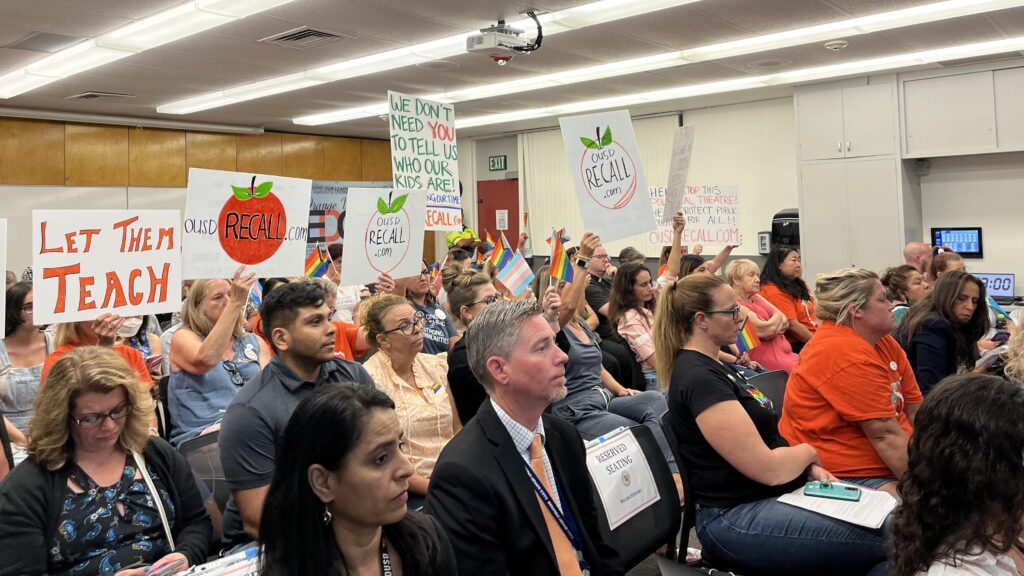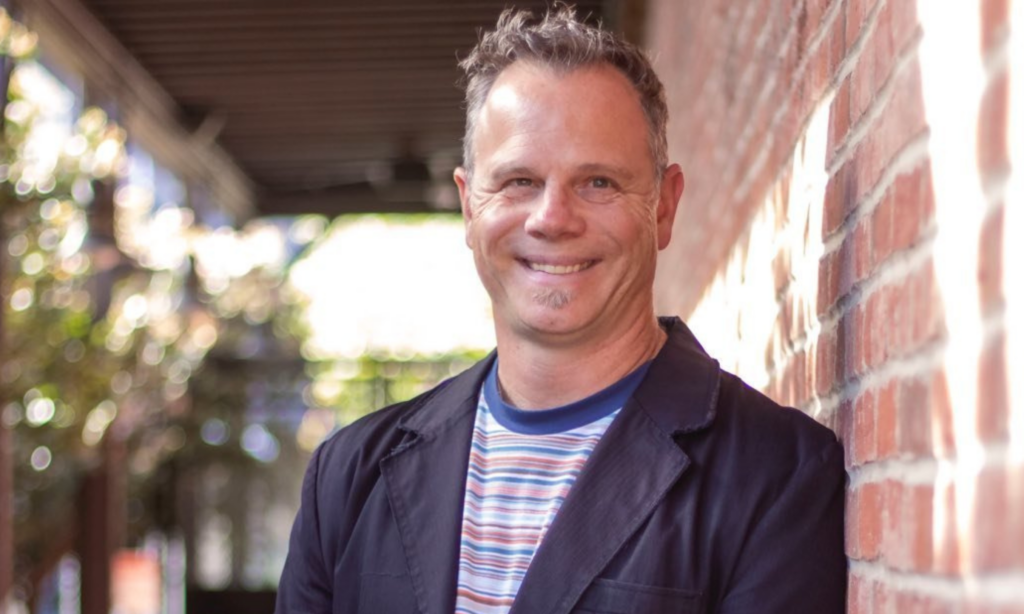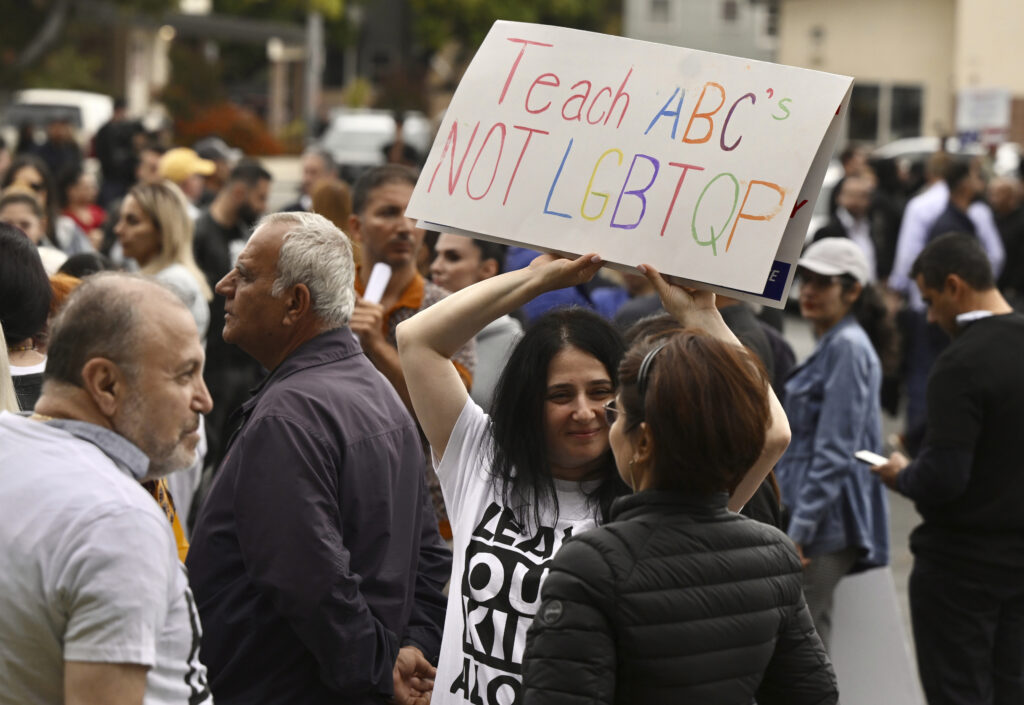
Packed crowd anticipates discussion on Orange Unified Parental Notification Policy on Sept. 8, 2023.
Credit: Mallika Seshadri / EdSource
Organizers seeking the ouster of two conservative members of the Orange Unified school board announced last week they had collected more than enough signatures to put the recall to a vote in the next several months.
The effort seeks the recall of board President Rick Ledesma and board member Madison Klovstad Miner, who was elected last November after defeating 22-year incumbent Kathryn A. Moffat by 0.2% — 221 votes out of 61,845 votes cast. Her election was pivotal in establishing a four-member conservative majority that had run on a uniform platform of parental rights. Ledesma and Miner had the financial backing of pro-conservative political action committees, including the Lincoln Club of Orange County, and the support of Jack Hibbs, an influential politically active pastor of Calvary Chapel Chino Hills, an evangelical megachurch.
The new majority’s first action was to fire Gunn Marie Hansen, the district’s popular superintendent, with one day’s notice during the Christmas break, when Hansen was abroad. During the heated four-hour school board meeting, several angry parents vowed a recall election, but it took several months to organize a campaign. Although Hansen was fired without cause, Ledesma later said that under Hansen, the district was “focusing too much on the social politics of education,” and the board planned to revisit policies related to sex education, student equity and ethnic studies.
The recall campaign is also running on a theme of fiscal responsibility, pointing to the cost of terminating Hansen’s contract, which, with vacation and benefits, was $505,000.
Last month, the conservative majority made Orange Unified the sixth California school district to require school officials to adopt a gender notification policy, requiring school officials to tell parents and guardians if their child engages in activities designed for the opposite sex or changes gender pronouns.
Darshan Smaaladen, recall committee co-chair and chief organizer, said the campaign had submitted more than 18,300 signatures — about 5,000 more than the 13,046 required. Organizers had to collect at least 10% of registered voters in the school district.
Smaaladen, a parent of two graduates and one current Orange Unified student, said she was “elated” by the number of signatures collected and “looks forward to more knowledgeable public voting on the issues in future elections.” She said the signature-gathering was done mainly by volunteers attending festivals, stationing outside schools and going door to door. Three hundred volunteer signature collectors signed a code of ethics, committing to acting in good faith and staying true to the campaign message, she said. Some teachers, many of whom live in the district, were among the canvassers.
“The Orange Unified Education Association is happy to see the petitions to be submitted weeks earlier than the deadline, and we see this as a statement of strength and support by the public for this recall,” said union President Greg Goodlander.
Paid solicitors were hired to ensure meeting a Nov. 8 deadline and collected 2,000 signatures, Smaaladen said.
In a lengthy email responding to EdSource’s request for a comment on the recall, district board member Miner wrote, “It’s essential to note that protecting students is my sole purpose, and the radical recall movement has made it clear that their quest for power over the children is nothing more than a strong political maneuver to influence and shape the children of OUSD. This has nothing to do with protecting or educating children.” (Go here for the full response.)
The Orange County Registrar of Voters must now validate the signatures, initially examining a large random sample, then doing a full certification, if needed. The Orange Unified school board must choose a date for the recall vote. Smaaladen said she hopes the board chooses the March state primary election; tying the recall vote to that election will save the district about $1 million from the cost of holding an election on a separate date, she said.
Located near Disneyland, Orange Unified draws from diverse neighborhoods in five cities plus unincorporated areas of Orange County; half of its 26,000 students are from low-income familes; 57% are Latino and a quarter are white.
According to Ballotpedia, only about 1 in 5 recall campaigns nationally have qualified for the ballot since 2009. Of those, fewer than half have unseated board members.
This effort could gain national attention and draw six-figure contributions on both sides. California Republicans and conservative PACs have targeted school board elections to outflank Democratic majorities in the Legislature, promote school choice, weaken teacher unions and oppose LGBTQ+ education. Democratic donors and the California Teachers Association in turn will weigh whether to encourage this and similar recalls, assuming it qualifies for the ballot, by donating heavily.
“Republicans have been talking about ratcheting up the fight on education policy for a few years. There have been some scattered skirmishes up until now, but this could be the all-out brawl that both sides have been anticipating,” said Dan Schnur, a longtime political observer who teaches political communications at the University of Southern California, UC Berkeley and Pepperdine University.
A similar recall campaign is under way to unseat three politically conservative members in Temecula Valley Unified, including board President Joseph Komrosky, whom Gov. Gavin Newsom condemned for denigrating the assassinated gay activist Harvey Milk as a pedophile. On Wednesday, leaders of the League of United Latin American Citizens de Inland Empire and the local branch of the NAACP civil rights group announced they were joining the effort. They have until Dec. 8 to turn in enough signatures to qualify.




